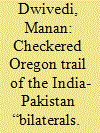| Srl | Item |
| 1 |
ID:
146738


|
|
|
|
|
| Summary/Abstract |
The paper provides a historical analysis of the pantheon of years and landmark developments and trail blazing iconic events as they subsumed the American foreign policy since the creation of free nations such as India and Pakistan in South Asia. The delineation of the India-Pakistan’s troubled relationship is not a difficult ask but the extraneous influence of great powers such as United States of America in an increasingly multi polar nature of the international system makes the deft balancing act of Washington, a challenging diplomatic and strategic exercise. Pakistan is a trusted and traditional ally while India has criss-crossed the pathways of “ Allyhood” with its divergent policy responses to Washington’s national interested defined Foreign Policy in South Asia.
|
|
|
|
|
|
|
|
|
|
|
|
|
|
|
|
| 2 |
ID:
152160


|
|
|
|
|
| Summary/Abstract |
The border disputes of India with China and Pakistan are a parting gift of the British to the subcontinent. It is about inaccessible land that the British had acquired on India’s Northern, Western and Eastern borders to protect British India from the perceived threat of a Russian invasion, as these lands could act as buffer areas. Much of it was settled on paper with no land demarcation done on ground, so much so when a road was built by the Chinese in Aksai Chin area, Government of India came to know of it only when the Chinese announced the inauguration of the road. Likewise unmarked borders with Kashmir have resulted in decades of unrest in the region.
|
|
|
|
|
|
|
|
|
|
|
|
|
|
|
|
| 3 |
ID:
154763


|
|
|
|
|
| Summary/Abstract |
The formation of the national unity government in Afghanistan – as envisaged in the power-sharing deal brokered earlier by US Secretary of State, John Kerry – marked the end of the months-long political stalemate. The political impasse, stemming from an alleged fraud in the presidential run-off elections, proved to be a major impediment in the process leading to the first democratic transition in Afghanistan.
|
|
|
|
|
|
|
|
|
|
|
|
|
|
|
|
| 4 |
ID:
170769


|
|
|
|
|
| Summary/Abstract |
The initiative taken by China to revive discussions on “The India-Pakistan Question”, which had been lying dormant on the agenda of the United Nations Security Council (UNSC) since December 1971, has potentially significant implications for India. This article looks at the details of “The India-Pakistan Question”, including the manner in which the UNSC twisted India’s complaint against Pakistani aggression on India’s territory in Jammu and Kashmir to broaden the scope to apply the “two-nation theory” on the basis of which the United Kingdom had partitioned British India and re-opened the accession of the Princely State of Jammu and Kashmir to India. The UNSC acknowledged that its resolutions failed to be implemented due to the inability of the Security Council to vacate the Pakistani aggression on India.
China (represented permanently in the UNSC by the Republic of China (ROC) till October 1971) was party to UNSC resolutions on “The India-Pakistan Question”. China did not adopt an activist role in drafting these resolutions between January 1948 to October 1971. After the unseating of the ROC from the UNSC and its replacement by the People’s Republic of China (PRC) in October 1971, an assertive China tried to use “The India-Pakistan Question” to counter India’s actions during the December 1971 India-Pakistan war which led to the independence of Bangladesh. The PRC cast its first veto against the admission of Bangladesh to the UN in August 1972.
UNSC resolutions on this issue were overtaken by the bilateral treaty signed between India and Pakistan at Simla in July 1972. China’s latest diplomatic initiative on this subject goes against five decades of inactivity of the UNSC on “The India-Pakistan Question”. It presages China’s attempt to use her permanent membership of the UNSC to exploit “The India-Pakistan Question” as a negotiating tactic to retain Chinese occupation of India’s territory in Jammu and Kashmir.
|
|
|
|
|
|
|
|
|
|
|
|
|
|
|
|